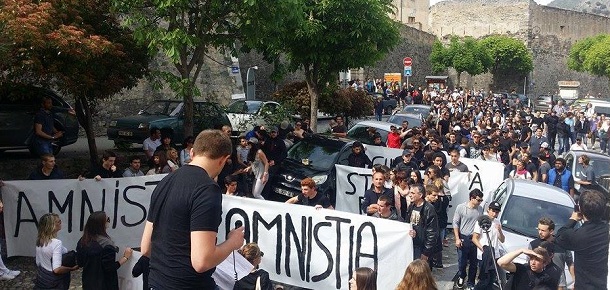8 September 2015
Over half of Corsica's 300 local councils back amnesty for political prisoners

Protesters call for the release of Corsican political prisoners
HUNDREDS of Corsican organisations, celebrities and local councils have joined the 'Amnistia' campaign calling for the release of Corsican political prisoners from French prisons more than a year on from the ceasefire of the island's major armed separatist group, the FLNC.
The campaign has been launched by the Solidarity Association, a support group for prisoners and their families, and has been gathering momentum as public demands for engagement from Paris grow over a year on from the announcement by the National Liberation Front of Corsica (FLNC) that it was ending its 38-year armed campaign against France.
The June 2014 ceasefire came following positive election results for nationalist parties on the island and increased co-operation between the various strands of the Corsican nationalist movement.
So far, over half of the 300 local and municipal councils in Corsica have backed the 'Amnistia' campaign, which is calling for the release of more than 30 Corsican political prisoners who are scattered throughout the French prison system, as well as allowing those who are 'on the run' to return home.
High-profile personalities from the worlds of sports, the arts, politics, media and cultural groups have also publicly backed the campaign.
Vice-President of the Solidarity Association, Katty Bartoli, says Paris can no longer ignore the demands of the Corsican people and it needs to respond to the growing calls for an amnesty for political prisoners:
"If Paris continues to ignore our legitimate demands then we will step up our campaign. The situation at the moment is intolerable. If our many years of struggle have taught us anything it's that building peace is the real challenge. The fight must go on until the last political prisoner is released."
Follow us on Facebook
An Phoblacht on Twitter
Uncomfortable Conversations

An initiative for dialogue
for reconciliation
— — — — — — —
Contributions from key figures in the churches, academia and wider civic society as well as senior republican figures





